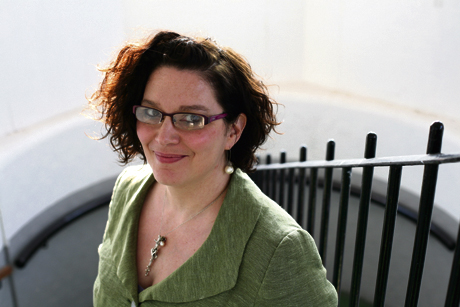Talking poetry with Katy Evans-Bush

Baroque in Hackney: Katy Evans-Bush
Blogger, published poet and self-proclaimed conversationalist Katy Evans-Bush was recently shortlisted for the Orwell Prize 2012.
Her blog Baroque in Hackney features critiques, anecdotes and musings, just like many other blogs. So what makes hers so popular?
In 2006, following a difficult redundancy, she was advised by a friend to start a blog for her poetry.
She explains that after spending a year reading blogs, researching, “looking for a blog that was poetry-related, but not just revising poems, or somebody complaining about not being published,” she realised there was a gap in the online poetry world.
“I thought it would be really boring to just publish my own poems on a website,” she continues, “and I was looking for blogs that recognise that poetry is part of literature, which is part of the arts, which is part of culture, which is part of the world.”
By this point she had already begun sharing her political views, her comic tales, her poetry and her critical perspectives on poetry on Baroque in Hackney.
“I never set out to fill a niche,” she says. “I just did what I was interested in. But then I realised that no one else was doing it and so I had a sense of responsibility.”
She considers her blogging to be work though she does not earn a living from it. “Rather than rewarding me in cash terms,” she says, “it has made things happen. There’s the Orwell shortlisting, for one, and I probably got my poetry publishing deals through the blog.”
Born in New York but having moved to Connecticut for school, Evans-Bush jokes that she was “cheated out of a New York upbringing.”
She moved to London aged 19, “ostensibly to study,” living first in Hackney Central, with a view of London Fields, and later moving to Stoke Newington, where she lives now.
“There was one coffee shop,” she says of Church Street in the 90s, “and I remember we went there and I said, great, we can live here because there’s a place for me to get coffee. Now look at it.”
Though she condemns the gentrification of parts of Hackney, believing the council to be incompetent and the influx of hipsters disappointing, the borough continues to inspire her writing.
For the Orwell Prize, she submitted 10 posts from her blog focusing on the 2011 riots in Hackney, as well as the government cuts and other political and humanist issues.
“My blog is about world views and connections between things. It’s political and engaged, attentive to what life is actually like,” she says.
She first started writing at the age of four, dictating a story called ‘The Guilty Fairy’ to her mother, who typed it on a typewriter. “I always wrote as a child,” she says, “and I drew. Just read and wrote and drew.”
Whilst believing that you don’t need a manual to learn how to write, she is in favour of master classes and writing groups. “If you have the drive, the creative approach, creativity to write poetry all you really need is that kind of sensibility,” she says.
“You can learn techniques, it always helps. I mean, opera singers have master classes, right?”
After initially writing poetry, Evans-Bush later attempted fiction. “As an adult you think you have to write fiction,” she explains. “That’s just what you do.”
But after getting one short story shortlisted and nothing published, she had a realisation. “I thought, that’s it: I have to just write poetry.”
She believes that some authors can work across genres but that poets’ novels don’t get as much attention as novelists’ poems, because “everyone is more interested if you’re a novelist.”
According to Evans-Bush, the poetry-world and the poets in it suffer a lack of recognition. “The sad truth is,” she says, “even in the poetry world you get a lot more attention for writing a blog than you do for writing poems.”
She contemplates the possibility that the world has enough poetry already and that we don’t need any more. But then she backtracks, remembering the importance of new work and the fact she is a contemporary, published poet.
We move on to the decline of the print industry. “We haven’t replaced paper as a medium,” she says, “we’ve just added another thing to it. Offline still exists.”
Her passion for print is yet to wane: “We’re book people, so we like books. I like my little bookshelf at home that has things on it that I’ve made.”
She does say, however, that as the internet stores poetry that is published online indefinitely, poets should send their best poetry to online magazines because “no matter how prestigious the paper magazine is, the issue circulates to its people and then it ends.”
The success of her blog has instilled in her an affection for the online world. “The internet has been very good to me,” she says, smiling. “I love the internet. It is my medium.”
After the interview I hang around for another half an hour, absorbed in her stories and recollections. I conclude that, true to her word, she is definitely a conversationalist.
More from Baroque in Hackney.
